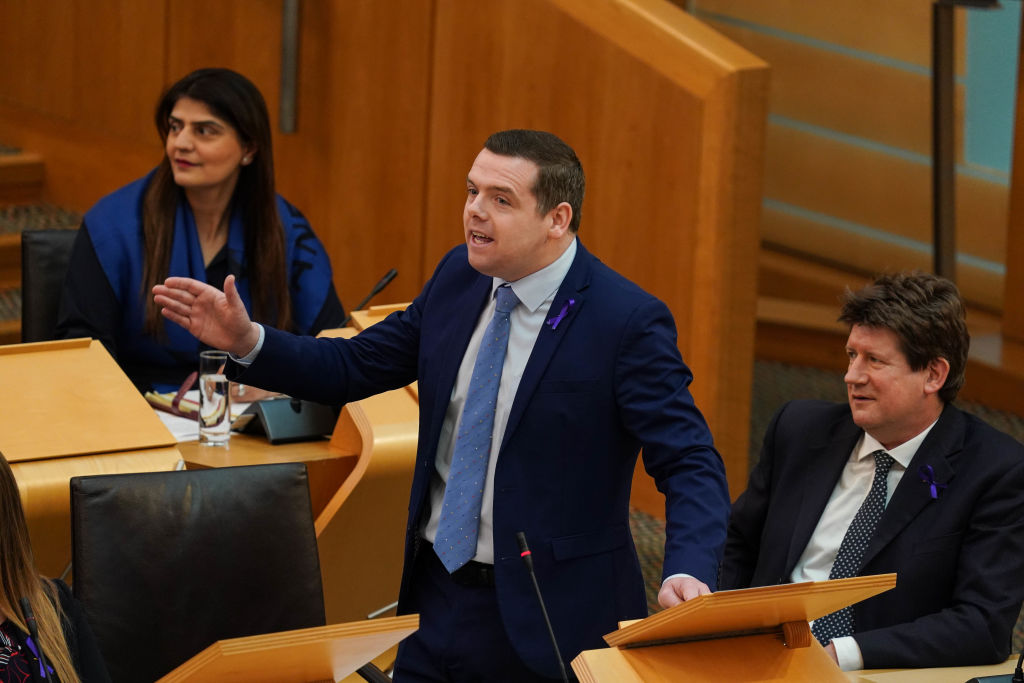The SNP’s internecine warfare has dominated political chatter for the past two months and the Scottish Conservatives, it seems, have been feeling left out. So, at the weekend, the Tories piped up. Douglas Ross, the Scottish leader, suggested that unionists should use their vote at the next general election for the candidate most likely to defeat the SNP incumbent.
The party in London was indignant with Ross’s apparent approval of Tory voters crossing the box for Labour and arming Sir Keir Starmer with more MPs. This is hardly the first time that the Scottish party and its London HQ have had a difference of opinion. This particular disagreement has the same roots as most of the others.
There is a contradiction at the heart of this Conservative and Unionist party; the two often work against each other. It has been clear, at least in the years since the Scottish independence referendum, that the Scottish side of the party is Unionist first and Conservative second, and that the English side of the party is Conservative first and Unionist second. Understanding this nuance makes Ross’s intervention expected, even logical. The bulk of the Scottish Conservative group of MSPs and its Scottish party members are driven to the point of obsession by beating nationalism. To them, it is second nature to prefer Labour and the Lib Dems over the SNP. Ask them if they’d rather have a Tory government and a strong SNP or a Labour government and a weak SNP and they would choose the latter every single day of the week.
It has been clear that the Scottish side of the party is Unionist first and Conservative second, and that the English side of the party is Conservative first and Unionist second.
All of this makes no sense MPs at Westminster. The Tory party is an electoral machine conditioned to the pursuit of power and is historically very effective in that pursuit. They would take 50 SNP MPs on their green benches if they still get to sit to the right of the Speaker as a result.
So, all in all, we should not perhaps be too surprised at Ross’s suggestion. There are, however, a number of elephants in the room. The first is that never-in-a-million-years will Labour, or the Lib Dems for that matter, reciprocate. Labour puts its wipeout in Scotland down to its alliance with the Tories in the Better Together campaign. Now that Labour have shown signs of substantial recovery, the last thing they are going to do is put that at risk through a Better Together 2.0 backroom deal on tactical voting.
And we’ve already tested this. I sit here in Edinburgh South, the constituency of Labour’s Ian Murray. It was part of a light-touch, informal triumvirate in 2017, along with Edinburgh West and Edinburgh South West. Unionists were nudged to vote Labour in South, Lib Dem in West, and Tory in South West, all either held or targeted by the SNP.
Murray was re-elected in South (a seat which had been held by the Lib Dems in previous years and which in any other country would be ‘naturally’ Tory), and Christine Jardine was elected for the Lib Dems in West. Predictably, the plan fell over in South West, where Labour polled nearly 25 per cent, stopping the Tories winning and allowing Joanna Cherry to come through the middle to win for the SNP.
The second elephant in the room is that this strategy further ‘Ulsterises’ Scottish politics. We are in severe danger of scrapping political debate in favour of arguments about constitutional identity. We know, do we not, that it cannot end well.
After receiving a public tongue-lashing from his UK party colleagues, Ross said that supporters of other parties should ‘unite behind the Scottish Conservatives’ to ‘see the SNP losing seats right across Scotland’.
There is confusion over what he said and what he meant and it is hardly the first time that events in Westminster have required Ross to eat his words and spit them back out in a different form. What is clear is that, once again, a leader of the Scottish Tory party is walking a tightrope. A brilliant Unionist strategy? Yes. A terrible Conservative strategy? Also, yes.






Comments